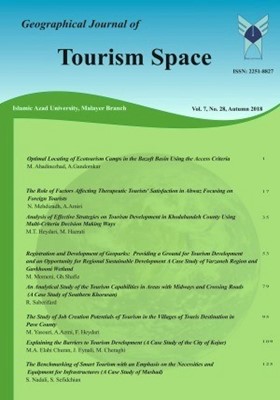Studying the feasibility of smart tourism with emphasis on the essentials and infrastructure requirements (case study of mashhad metropolis)
Subject Areas :
sussan nadali
1
*
1 - shandiz institue of higher educations
Received: 2018-10-02
Accepted : 2018-11-13
Published : 2018-11-22
Keywords:
smart tourism,
smart tourism infrastructure,
ict in smart tourism,
smart tourism business,
smart tourism destinations,
smart tourism experiences,
Abstract :
In any cases, in many countries, the tourism industry is considered as a high-income industry and it is considered as one of the main sources of foreign exchange earnings. Due to the role and importance of the tourism industry in various aspects, including foreign exchange earnings and income source for the state, it can be the source of Employment creation. In today's world, we can say almost everything we see is smart. The tourism industry need is also no exception to intelligent manufacturing. Nevertheless, the research on smart tourism in Iran has been very limited. So the existence of intelligent tourism is necessary for the provision of services with higher quality and speed. The purpose of this study is to investigate the feasibility of intelligent tourism as one of the most important challenges facing Mashhad's tourism destination, Mashhad tourism business ecosystems and tourists' experiences, and avoid the realization of tourism. Research is considered as the result of applied research and subsequently, in terms of the type of research purpose, is descriptive and in terms of qualitative data type. The data collection tool is a questionnaire and is used for analysis of SPSS software. Data were analyzed by variance analysis. As a result, research hypotheses confirming the existence of intelligent tourism infrastructure in Mashhad city were confirmed. At the end, there are suggestions for the development and implementation of smart tourism and suggestions for continuing research in this area.
References:
کمالی،ن. 1396. « شناسایی و تعیین شاخصهای استانداردسازی خدمات الکترونیک گردشگری مطالعه موردی مشهد». کارشناسیارشد جغرافیا و برنامهریزی گردشگری. دانشکده ادبیات و علوم انسانی دانشگاه زنجان. 81 صفحه.
محمدزاده یزد، ف. 1392. «شهر هوشمند؛ مطالعه موردی: شهروندان و کارگزاران سازمان شهرداری مشهد». کارشناسی ارشد علوم ارتباطات اجتماعی. دانشکده علوم اجتماعی دانشگاه تهران. 183 صفحه.
مومن زاده، ف. اذاتی،م. 1390. "توسعه فناوری اطلاعات و گردشگری هوشمند با تأکید بر صنایعدستی شهر اصفهان". مدیریت و توسعه گردشگری راهکارها و چالشها، تهران. 11 خرداد 1390. 12 صفحه.
یعقوبی، ر. 1396. «امکان سنجی توسعه گردشگری هوشمند از دیدگاه کارکنان دانشی (شرکتهای گردشگری استان ایلام)»، پایاننامه کارشناسی ارشد مدیریت بازرگانی. دانشکده ادبیات و علوم انسانی دانشگاه ایلام. 109صفحه.
Buhalis, D. , & Amaranggana, A. (2015). Smart tourism destinations enhancing tourism experience through personalisation of services. In Information and communication technologies in tourism 2015 (pp. 377-389). Springer, Cham.
Buhalis, D. , & Amaranggana, A. (2015). Smart tourism destinations enhancing tourism experience through personalisation of services. In Information and communication technologies in tourism 2015 (pp. 377-389). Springer, Cham.
Del Chiappa, G. , & Baggio, R. (2015). Knowledge transfer in smart tourism destinations: Analyzing the effects of a network structure. Journal of Destination Marketing & Management, 4(3), 145-150.
Gretzel, U. , Sigala, M. , Xiang, Z. , & Koo, C. (2015). Smart tourism: foundations and developments. Electronic Markets, 25(3), 179-188.
Gretzel, U. , Werthner, H. , Koo, C. , & Lamsfus, C. (2015c). Conceptual foundations for understanding smart tourism ecosystems. Computers in Human Behavior, 50, 558-563.
Hunter, W. C. , Chung, N. , Gretzel, U. , & Koo, C. (2015). Constructivist research in smart tourism. Asia Pacific Journal of Information Systems, 25(1), 105–120.
Jennings, G. , & Weiler, B. (2004). Mediating meaning: Perspectives on brokering quality tourist experience. Melbourne: Monash University.
Jennings, G. , et al. (2009). Quality tourism experiences: Reviews, reflections, research agendas. Journal of Hospitality Marketing & Management, 18, 294–310.
Li, Y. , Hu, C. , Huang, C. , & Duan, L. (2017). The concept of smart tourism in the context of tourism information services. Tourism Management, 58, 293-300.
Lopez de Avila, A. (2015). Smart Destinations: XXI Century Tourism. Presented at the ENTER2015 Conference on Information and Communication Technologies in Tourism, Lugano, Switzerland, February 4-6, 2015.
Mascarenhas, O. A. , Kesavan, R. , & Bernacchi, M. (2006). Lasting customer loyalty: A total customer experience approach. Journal of Consumer Marketing, 23(7), 397–405.
McCarthy, J. C. , & Wright, P. C. (2004). Technology as experience. Cambridge, MA: MIT Press.
Neuhofer, B. , Buhalis, D. , & Ladkin, A. (2015). Smart technologies for personalized experiences: a case study in the hospitality domain. Electronic Markets, forthcoming.
Pine, B. J. , & Gilmore, J. H. (1999). The experiences economy: Work is theatre and every business is a stage. Boston, MA: Harvard Business School Press.
Stickdorn, M. , & Zehrer, A. (2009). Service design in tourism: Customer experience driven destination management. In S. Clatworthy (ed. ). First Nordic conference on service design and service innovation. DeThinkingService-ReThinking-Design. Oslo: Norway.
Tu, Q. & Liu, A. (2014). Framework of Smart Tourism Research and Related Progress in China. In International Conference on Management and Engineering (CME 2014), pp. 140-146. DEStech Publications.
Wang, D. , Park, S. , & Fesenmaier, D. (2012). The role of smartphones in mediating the tourism experience. Journal of Travel Research, 51(4), 371–387.
Werthner, H. (2003, August). Intelligent systems in travel and tourism. In IJCAI (Vol. 3, pp. 1620-1625).
Zouni, G. , & Kouremenos, A. (2008). Do tourism providers know their visitors? An investigation of tourism experience at a destination. Tourism and Hospitality Research, 8(4), 282-297.
_||_

